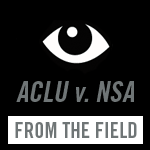
When I first read the 1978 Foreign Intelligence Surveillance Act, I thought to myself “This can’t be constitutional … they don’t really do it!”
I‘ve never had a FISA case myself … that I know of. … But FISA set the course for an astonishing legislative assault on privacy rights versus government intrusion and surveillance. Secret courts! Secret affidavits! Secret warrants! Surely this could not pass constitutional scrutiny. But it did.
What civil libertarians saw as patently unconstitutional, legislators, judges and the Executive accepted as uncontroversial. After all, if you are not a terrorist, what’s to fear? National security trumps personal security.
But, as the president says, “9/11 changed all that.” The Executive concluded even the minimal strictures of FISA were trumped by the “commander-in-chief” power – not even the FISA court need be consulted to authorize the Executive to wiretap those it—secretly—decided had ties to terrorists. Congress went along when it expanded executive power at the expense of the Fourth Amendment with the Patriot Act in 2001.
The Fourth Amendment stands between free citizens and a police state, just ask those Japanese-Americans who were seized and imprisoned in WWII. Protection of our Fourth Amendment rights took off in the 60s with the extension of the exclusionary rule to the States. Searches, seizures, bugs or wiretaps carried out without a warrant or reasonable, exigent circumstances no longer yielded admissible evidence to support criminal convictions.
My first contact with the issue was as a law student in 1965, when Klan members unsuccessfully sought to suppress the seizure of their robes, hoods, guns and whips in their trial for killing Lemuel Penn, a DC educator and Army Reserve officer, as he drove through Georgia.
The 60s and 70s saw judicial increases in protection of personal security from governmental intrusion, through court decisions that were subject to withering public and political attacks, accusing judges of coddling criminals and releasing them on mere technicalities. It was a short-lived euphoria for civil libertarians.
The war on drugs turned the tide. Maybe it was the Omnibus Crime Control and Safe Streets Act in 1968—expanding the scope of wiretaps and bugs—that marked the initial downward slide of Fourth Amendment rights. Certainly the learning curve of law enforcement officers didn’t help, as they grew accustomed to falsely testifying that what they seized was in plain view, or that the exigent circumstances required them to search without a warrant.
The endless war on drugs not only eroded this fundamental protection citizens have against unwarranted government intrusion, but also fueled the massive law enforcement-prison industry that makes us a world leader in the number of disenfranchised citizens under the continual control of government supervisors.
January 31, 2007, marks a landmark day in Fourth Amendment jurisprudence. In ACLU v. NSA, civil libertarians, who have retreated to possibly the last trench of Fourth Amendment defense, will argue that NSA surveillance based solely on executive authorization is illegal even under the minimal requirements of FISA.
The Act I had thought so repugnant to the Fourth Amendment has now become a basis for protecting what little is left of it.
The Sixth Circuit decision may well set the course for the future. Will our citizens’ rights to be free from government start on the road back to respect? Or will the war on terror drive the final nail into the coffin of the Fourth Amendment, bury its protection in the name of national security, and lead us down the perilous road to trials of “terrorists” based on secret wiretaps, bugs and break-ins, fueling a new law enforcement-big prison industry, rivaling the monster created by the war on drugs?
Free citizens? From what?
David Broiles is Vice President-Legal, ACLU of Texas



